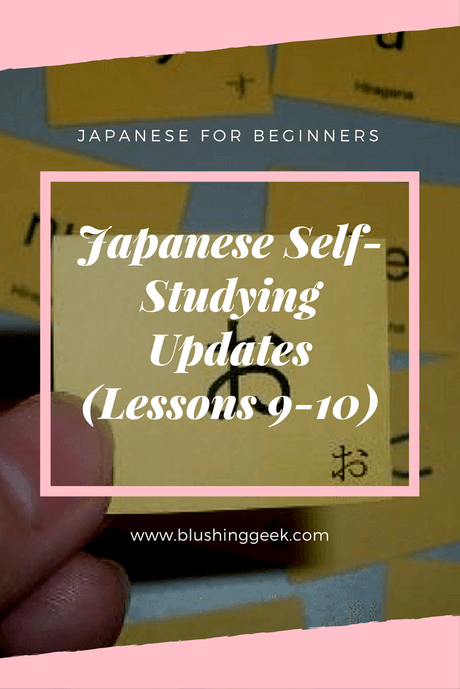Happy Monday everyone! It’s time for another Japanese Self-Studying updates  For this week, I’ve got to learn about the MASU form and other particles which I am really excited to share with you below.
For this week, I’ve got to learn about the MASU form and other particles which I am really excited to share with you below.
Once again, let me remind you that I am not attempting for a tutorial but just sharing what I’ve learn from Misa-sensei’s Grammar Lessons for Absolute Beginners in Youtube.
Note: Click on the lesson number to read the whole update.LESSON 9 – MASU FORM
MASU form
- used for formal speech
How to make MASU form (for iru/eru ending)
- get rid of RU and put MASU
- Example: taberu (to eat) => tabeMASU
Another Examples:
- I eat sushi
=> sushi wo taberu (informal)
=> sushi wo tabeMASU (formal) - I eat breakfast everyday
=> mainichi asagohan wo taberu (informal)
=> mainichi asagohan wo tabeMASU (formal)
miru (to watch, to see) => miMASU
Example:
- I watch TV every night
=> maiban terebi wo miru (informal)
=> maiban terebi wo miMASU (formal)
* you can ofcourse change the word order but usually, time related words are placed at the beginning of a sentence.
***
Time in Japanese (time + ji)
ji – is a suffix used for o’clock.
- form: time + ji
- Examples: 1 o’clock => ichi ji, 2 o’clock => ni ji, 3 o’clock => san ji
- Irregulars: 4 o’clock => yo ji, 7 o’clock => shichi ji, 9 o’clock => ku ji
Particle NI – time marker
- Example: at 11o’clock => juichi ni ji
***
neru (to sleep) => neMASU
Example:
- I go to sleep at 11
=> juichi ji ni neru (informal)
=> juichi ji ni neMASU (formal)
okiru (to wake up) => okiMASU
Example:
- I wake up at 7
=> shichi ji ni okiru (informal)
=> shichi ji ni okiMASU (formal)
How to make MASU form (for other words – u verbs)
- change the U into I and put MASU
- Example: kiku (to write, to draw) => kikIMASU
hanasu (to speak, to talk) => hanaSHIMASU
*there’s no SI sound in Japanese, instead, they use SHIExample:
- I speak English
=> Eigo wo hanasu (informal)
=> Eigo wo hanaSHIMASU (formal)
toru (to take, to grab) => torIMASU
Example:
- I take a picture sometimes
=> tokidoki shashin wo toru (informal)
=> tokidoki shashin wo torIMASU (formal)
How to make MASU form (for irregular verbs)
suru (to do) => shimasu
Examples:
- to study
=> benkyo suru (informal)
=> benkyo shimasu (formal) - to play tennis
=> tenisu wo suru (informal)
=> tenisu wo shimasu (formal) - to cook
=> ryouri wo suru (informal)
=> ryouri wo shimasu (formal) - I like cooking
=> ryouri wo suru no ga suki desu
*the “masu formed” verbs can only be placed at the end of the sentence, if it’s in the middle, use the dictionary/informal terms, eg. suru
*Japanese “R” sound is somewhere between “D”, “R” and “L”
kuru (to come) => kimasu
Example
- I’ll come tomorrow
=> ashita kuru (informal)
=> ashita kimasu (formal)
New vocabularies learned from this lesson:
- everyday => mainichi
- every night => maiban
- o’clock => ji (suffix)
- time marker => ni (particle)
- sometimes => tokidoki (onomatopoeia => heartbeat)
- food, cuisine => ryouri
LESSON 10: Particles
wa (は) – topic marker
- Example: My dog is small
=> watashi no inu wa chisai desu
ga (か) – subject marker
- putting emphasis on the word before ga
- Example: I’m Misa
=> watashi ga Misa desu
(I am the one) who is Misa
wo (を) – object marker
- Example: I read a book
=> hon wo yomimasu
ni (に) – time marker
- Examples: I wake up at 7
=> shichi ji ni okimasu - also used for days
***
Days in Japanese (with suffix yobi)
yobi – suffix added to days
Examples:
- Monday => getsuyobi
- Tuesday => kayobi
- Wednesday => suiyobi
- Thursday => mokuyobi
- Friday => kinyobi
- Saturday => doyobi
- Sunday => nichiyobi
***
- Example: on Monday
=> getsuyobi ni
***
Another Examples:
- I study Japanese on weekends
=> shumatsu ni nohongo wo benkyo shimasu
VS
shumatsu wa nihongo wo benkyo shimasu
(on weekends, I study Japanese / as for weekends, I study Japanese)
- On January
=>ichigatsu ni
***
- NI could also used for to (direction)
***
kan – a suffix added to place where we watch or see something
- Example: cinema => eigakan
***
Examples:
- I’ll go to the cinema
=> eigakan ni ikimasu - On Monday, I’ll go to the cinema
=> getsuyobi ni eigakan ni ikimasu *it’s not weird that you use NI more than once in a sentence - The cats come to the house everyday
=> neku wa mainichi uchi ni kimasu
***
kaeru – to go home, return
- an exception
- masu form:kaerimasu
- Example: I’ll go home
=> uchi ni kaerimasu *it’s not weird if you add uchi (home) along with kaerimasu - Another example: This year, I’ll go back to Japan
=> kotoshi nihon ni kaerimasu
***
de (で) – used to indicate the place at which an action or event takes place
- in or at <location>
Examples:
- In the cinema
=> Eigakan de - I’ll see a movie in the cinema
=> Eigakan de iega wo mimasu
***
For Japanese restaurant, it’s ok to use nihon no resutoran but it can also mean like, restaurants in Japan. Instead, we use nihon riyouri (Japanese food/cuisine) or washoku (Japanese food) which is more common.
Japanese restaurant
=> nihon riyouri no resutoran
=> washoku resutoran
***
Other examples:
- I’ll eat dinner at the Japanese restaurant
=> nihon riyouri no resutoran de bangohan wo tabemasu - I’ll buy a bento in the convenience store
=> konbini de obento wo kaimasu * bento (lunch box) – you can add O to make it more polite - I’ll watch TV at home
=> uchi de terebi wo mimasu
***
- de particle could also be used as – by using (something)
Examples:
- I draw a picture with a pen (by using a pen)
=> pen de e wo kakimasu - I eat sushi with chopsticks (by using chopsticks)
=> hashi de sushi wa tabemasu - I talk on skype (by using skype)
=> Sukaipu de hanashimasu - I take pictures with this camera
=> kono kamera de shahin wo torimasu
to (と) – accompaniment
- used with somebody or someone
Example:
- I’ll handout with my friends on Sunday
=> nichiyobi ni tomodachi to asobimasu * you could also use WA (は)particle instead of to (と)
New vocabularies learned from this lesson:
- small => chisai
- suffix added for days => yobi
- Monday => getsuyobi
- Tuesday => kayobi
- Wednesday => suiyobi
- Thursday => mokuyobi
- Friday => kinyobi
- Saturday => doyobi
- Sunday => nichiyobi
- weekends => shumatsu
- a suffix added to place where we watch or see something => kan
- cinema => eiga-kan
- art museum => bijutsu-kan
- library => tosho-kan
- house, home => ie
- to go home, return => kaeru
- this year => kotoshi
- Japanese food => washoku
- convenience store => konbini
- chopsticks => hashi
- bridge => hashi (different intonation with chopsticks => hashi)
- skype = > sukaipu
- friend => tomodachi
- to play, handout => asobu
- particle for used to indicate the place at which an action or event takes place => de
- particle for accompaniment => to
- grandma => obaachan
I’ve heard that there are a lot of other uses for each particles which I hope Misa-sensei will be tackling more in the future lessons. So for this week, I have two lessons to study and to get familiarize with until the next lessons. I can’t wait to learn more!
For the previous lessons, you can refer to my previous updates for lessons 1-8. If you want to study Japanese language as well, I am highly recommending Misa-sensei’s youtube tutorial for Japanese Grammar Lessons for Absolute Beginners. Jaa mata ne!


